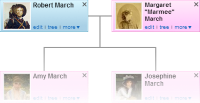


The Wollstonecraft Name There are generally many changes to the spelling of names over time. Differences can be understood by considering that many years ago few people were literate, so clerks had torecord names phonetically.
Among the written variations to the name Woolstonecraft can be found alternatives such as Wollstonecraft, Woolstoncroft and Wolstencroft.Occasionally, it can also be found as Wors(t)encroft, Wosencroft, or even Wozencroft. The most normal ending is croft, with the derivation of craft being somewhat unusual.
Wollstonecraft derived originally from the Saxon name of Wulfstan which later developed into Wol(f)stan. The name means wolf stone and is one of a number of names based on Wolf. In ancient mythology, the wolf was held in high esteem and was sacred to the god Woden. Woden's wolf was symbolic of power and freedom. As an animal to be feared in the forests of Europe, together with the aura of mystique surrounding it, the wolf features in very many folk tales and legends.
Tun refers to enclosed ground, which can also be a village or town; whilst the addition of croft, similarly relates to an enclosed parcel of land.
Phonetics and Pronunciation To download a small (12k) audio pronunciation file of Wollstonecraft, please click here